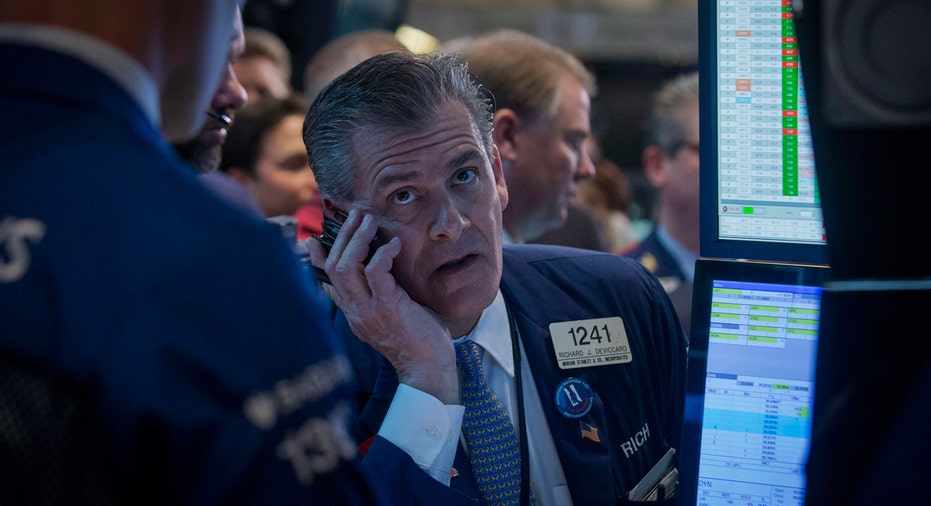Wall Street Plunges in Late-Session Selloff, Fed Uncertainty Weighs

U.S. equity markets accelerated a late-session selloff into the closing bell Friday, a day after the Federal Reserve opted to keep its benchmark interest rate unchanged.
The Dow Jones Industrial Average was 292 points lower, or 1.75% to 16382. The S&P 500 declined 32, or 1.62% to 1958, while the Nasdaq Composite shed 66 points, or 1.36% to 4827.
Today’s Markets
After an underwhelming reaction from Wall Street on Thursday following the Federal Open Market Committee’s decision not to raise short-term interest rates, the major averages shed nearly 2% on Friday as the broader averages gave up all of their weekly gains and then some.
For the FOMC, September was the month that could have been. But citing global growth concerns thanks to recent instability in China’s economic-growth story, and worries about how those fears might affect emerging-market currencies, and even the U.S. economy, the central bank opted to hold rates near historic lows of a near-zero range.
Immediately following the decision, U.S. equity markets saw volatile swings as they attempted to determine whether the news was a buy or sell signal. On Friday, the answer looked to be “sell.”
Aaron Jett, vice president of equity research for Bel Air Investment Advisors said for once, the market action is relatively easy to interpret.
“The Fed was too dovish. They were concerned about global growth and the market didn’t hear the message it wanted to hear: That things were getting better, the U.S. was having some strength, and that it’s not, on a fundamental baisis, changing outlook. But there was a lot of caution [from the Fed] and the market didn’t like it,” Jett said.
For David Joy, chief market strategist at Ameriprise Financial (NYSE:AMP), the Fed’s move begs the question: Where do we go from here?
“If they want to hike this year, and 13 of 16 members said they expect to, it looks like they’ll have to focus on market stability rather than economic improvement, because I don’t think you can get [the latter] in such a short time. If the market stabilizes and people feel better at the October or December meetings, then the Fed can follow through,” he said.
In order for the central bank to take action, Joy said the Fed needs to see stabilization in Chinese economic data which has been shaky as of late and market-based measures of inflation expectations have to be tempered with strong economic data.
“In the absence of those things, if we don’t see evidence of accelerating growth, then I would say the next major influence is domestic inflationary pressures. Commodity prices are likely to stay pretty depressed; import prices are likely to stay depressed. Expect to see some wage pressures with employment as low at it is. That could force the Fed’s hand. It’s probably not imminent, but we’re in an environment where you could see some of that,” he explained.
Third-quarter earnings season is just around the corner, and Jett said that could help take some focus away from the Fed – at least for a little while.
“Any move back toward fundamentals and individual companies will always be a good thing rather than focusing on macro headlines,” he said. “However, this will be a different quarter of comps overall. So, there could be some pressure as far as expectations or the ability for companies to deliver earnings.”
In the meantime, with a lack of U.S. economic releases and a slow corporate-news flow on the session, markets were left to parse the Fed decision further.
In recent action, the yield on the benchmark 10-year U.S. Treasury bond was 0.069 percentage point lower, to 2.148%.
Meanwhile, global markets slumped in reaction to the U.S. central bank’s decision.
In Europe, the Euro Stoxx 50, which tracks large-cap companies in the eurozone, dropped 3.02%. The German Dax declined 3.06%, while the French CAC 40 shed 2.56%, and the UK's FTSE 100 slid 1.34%.
Over in Asia, equity markets were mixed. China’s Shanghai Composite index added 0.38%, while Hong Kong’s Hang Seng rose 0.30%. Japan’s Nikkei declined 1.96% on the session.
In commodities, global oil prices traded to the downside. U.S. crude prices fell 3.54% to $45.23 a barrel, while Brent, the international benchmark, slipped 2.18% to $48.01 a barrel.
Gold prices rose 1.82% to $1,137 a troy ounce, while silver gained 1.24% to $15.16 an ounce. Copper, meanwhile, declined 2.79% to $2.38 a pound.
In recent trade, the U.S. dollar was lower against a handful of global currencies, while the euro traded 0.59% lower against the greenback.



















